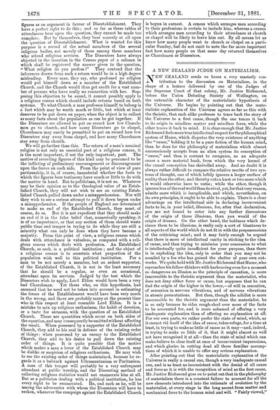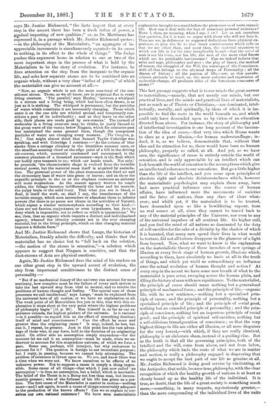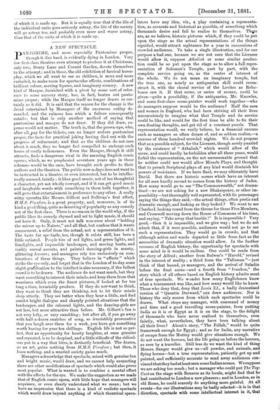A NEW ZEALAND JUDGE ON MATERIALISM.
NEW ZEALAND sends us home a very masterly con- tribution to the discussion on Materialism, in the shape of a lecture delivered by one of the Judges of the Supreme Court of that colony, Mr. Justice Richmond, before the Union Debating Society of Wellington, on the untenable character of the materialistic hypothesis of the Universe. He begins by pointing out that the mate- rialistic explanation of the Universe agrees so far as this with the theistic, that each alike professes to trace back the story of the Universe to a first cause, though the one traces it back to its origin in mindless matter and mindless force, while the other traces it back to mind. It is clear enough that Mr. Justice Richmond feels more true intellectual respect for the philosophical system of Hume, which disputes the very existence of anything like "cause," holding it to be a pure fiction of the human mind, than he does for the philosophy of materialism which almost unconsciously accepts from an alien system its conception of "cause," and then is content to recognise, as an adequate cause a mere material husk, from which the very kernel of the causal conception has shrivelled away. And no doubt it is always rather difficult to compare the relative merits of two sys- tems of thought, one of which loftily ignores a larger surface of reality than the other, and thereby cuts a knot or two more which it would otherwise have to untie ; while the other, though it ignores less of the real world than its rival, yet, for that very reason, admits more which is inexplicable, and which, nevertheless, on its own principles, it ought to be able to explain. There is a clear advantage on the intellectual side in declaring inconvenient facts to be, in your belief, illusions, for, after that declaration, you are not bound to enter into any further discussions of the origin of those illusions, than you would of the origin of dreams. On the other hand, the boldness which de- clares them to be illusions, is really only a sort of bluntness to all aspects of the world which do not fit in with the prepossessions of the criticising mind; and it may fairly enough be argued that there is more of intellectual sanity in sticking to the idea, of cause, and then trying to minimise your concession to what is intellectually quite insufficient for your purpose, than there is in exploding the idea, only in order that you may not be assailed by a foe who has gained the shelter of your own out- works. We quite hold with Mr. Justice Richmond that Hume, who reproaches his fellow-thinkers with harbouring even for a moment so dangerous an illusion as the principle of causation, is more inaccessible to the theistic argument than the materialist, who does not deny either force or cause, but supposes that he can find the origin of the higher in the lower,—of will in sensation, of sensation in nervous vibrations, and of nervous vibrations in atomic permutations. But then, though the nihilist is more inaccessible to the theistic argument than the materialist, he is so only because he rides rough-shod over more of the facts to be accounted for, and is more ashamed of offering a very inadequate explanation than of offering no explanation at all. For our own parts, we rather prefer the state of mind, which, as it cannot rid itself of the idea of cause, takes refuge, for a time at least, in trying to make as little of cause as it may—and, indeed, in trying to make so little of it, that it might almost as well not have recognised it at all—than the state of mind which can make-believe to clear itself at once of inconvenient impressions, and which glories in cutting dead all those familiar assump- tions of which it is unable to offer any serious explanation.
After pointing out that the materialistic explanation of the Universe is really a causal one, though a very inadequate causal one, and. is as least as inconsistent with the denial of all cause and force as it is with the recognition of mind as the first cause, Mr. Justice Richmond goes on to point out that in the philosophy of materialism there is a constant failure to account for all the new elements introduced into the rationale of evolution by the materialist, at every stage in the long ascent from matter and mechanical force to the human mind and will. " Fairly viewed," says Mr. Justice Richmond, " the facts import that at every step in the ascent there has been a fresh influx of power, a nadual imparting of new qualities ;" or, as Dr. Martineau has expressed it, in a passage which Mr. Justice Richmond quotes ; —in the philosophy of the Materialists, an aggregate of in- appreciable increments is simultaneously equated--in its cause to nothing, in its effect to the whole of things." The Judge pushes this argument home in relation to one or two of the most important steps in the process of what is held by the Materialists to be the story of evolution. For instance, he fixes attention on the step from the inorganic to the organic life, and asks how separate atoms are to be combined into an organic whole, without a very clear "influx of power," of which the materialist can give no account at all :—
" Now, an organic whole is not the mere sum-total of the con- stituent atoms. These, as we all know, are in perpetual flux in every living creature. ' The parallel,' says Huxley, between a whirlpool in a stream and a living being, which has been often drawn, is as just as it is striking. The whirlpool is permanent, but the particles of water which constitute it are incessantly changing. Those which enter it on the one side are whirled around, and temporarily con- stitute a part of its individuality ; and as they leave on the other side, their places are made good by new-corners.' The turmoil of molecules in a living creature may, he thinks, be justly likened to the great wave of the vortex below Niagara, which for centuries past has maintained the same general form, though the component particles of water are changing every moment. [The Crayfish, p. 84.] One might almost think that Samuel Taylor Coleridge was speaking, and with Coleridge I continue :—`As the column of blue smoke from a cottage chimney in the breathless summer noon, or the steadfast-seeming cloud on the edge point of a hill in the driving air-current, which, momently condensed and recomposed, is the common phantom of a thousand successors—such is the flesh which our bodily eyes transmit to us ; which our hands touch. Not only,' he proceeds, 'the characteristic shape is evolved from tha invisible central power, but the material mass itself is acquired by assimila- tion. The germinal power of the plant transmutes the fixed air and the elementary base of water into grass or leaves ; and on these the organific principle in the ox or the elephant exercises an alchemy still more stupendous. As the unseen agency weaves its magic eddies, the foliage becomes indifferently the bone and its marrow, the pulpy brain or the solid ivory. That what you see is blood, is flesh, is itself the work, or, shall I say, the translucence of the invisible energy, which soon surrenders or abandons them to inferior powers (for there is no pause nor chasm in the activities of Nature), which repeat a similar metamorphosis according to their kind ;- these are not fancies, conjectures, or even hypotheses, bat facts, to deny which is impossible, not to reflect on which is ignominious.' We see, then, that an organic whole imports a distinct and individualised agency, whereof the identity consists not in the ever changing material, but in the living principle, which on that changing material imposes a definite form."
And Mr. Justice Richmond shows that Lange, the historian of Materialism, frankly admits the difficulty, and thinks that the materialist has no choice but to " fall back on the solution, —the motion of the atoms is sensation,"—a solution which appears to suggest that Niagara is sensitive, and that the dust-storms of Asia are physical emotions.
Again, Mr. Justice Richmond fixes the mind of his readers on one other great step in the upward ascent of evolution, the step from impersonal sensitiveness to the distinct sense of personality r-
" But if no mechanical theory of the universe can account for mere sentiency, how complete must be the failure of every such system to take the last upward step from vital to mental, and to resolve the problems of human thought and feeling. The special case of those processes we call intellectual,' says Lange, must be explained from the universal laws of all motion, or we have no explanation at all. The weak point of all Materialism lies just in this, that with this ex- planation it stops short at the very point where the highest problems of philosophy begin' [id. p. 30]. Man himself is, so far as our ex- perience extends, the highest product of the universe. Is it rational —is it possible—to regard him as the effect of something destitute itself of mind and consciousness ? Can the effect be more and greater than the originating cause ? It may, indeed, bo less, but can it, I repeat, be greater. Just in this point lies the vast advan- tage of those who, in any form, hold to the doctrine of an originating mind. On either side an assumption simply stupendous—for the moment let me call it an assumption—must be made, when we en- deavour to account for this stupendous universe, of which we form a part. Some one, perhaps, will interject, but why endeavour to account for it ? The question is foreign to our immediate purpose ; but I reply, in passing, because we cannot help attempting. The problem of existence is thrust upon us. We are, and know there was a time when we were not. We know ourselves to be effects of an unknown power. Not to suppose a cause is simply a thing impos- sible. Some cause of all things—that which I just now called an assumption '—is then no assumption, but a belief, which is inevitable. The belief of the Theist is in a Being not less than man, but immea- surably greater; who of the fullness of his life has given us a por- tion. The first cause of the Materialist is matter in motion—nothing more—and I ask again, is such a cause of things conceivably adequate to the production of the known effects ? Can we so explain to our- selves oar own rational existence ? We have seen materialistic explanation brought to a stand before the phenomenon of mere organic life. How can it deal with the fact of conscious personal existence? Have I, then, no meaning, when I say, I AM P Let us ask ourselves that question, for it is vain to argue with those who will not face it. Then are we, in deference to supposed deductions from physical ex- perience, to give the lie to that inner consciousness which tells us that we are other than, and more than, the material organism to which our life is for the time inexplicably bound—that the mind of man is not his brain, nor his life, the sum of the mere vital forces which are its perishable instruments ? Can we indeed believe that saint and sage, philosopher and poet ; the play of fancy, the method of reason, the struggles of the Will, the warnings of the Conscience, with all that belongs to the abysmal deeps of Personality ; all the drama of history ; all the passion of life,—are, as this pseudo- science pretends to teach us, the mere outcome and expression of molecular change, all products alike of the fortuitous concourse of atoms ?"
This last passage suggests what is to our minds the great answer to materialism,—namely, that not merely our minds, but our practical lives, and the minds and practical lives of materialists, just as much as of Theists or Christians,—are dominated, intel- lectually, morally, and spiritually, by ideas of which it is im- possible to find the roots in the world beneath us, and which could only have descended upon us by virtue of an education directed from above. For instance, the story of philosophy and of intellectual investigation is one long account of the fascina- tion of the idea of cause,—that very idea which Hume wants to class as a pure illusion,—for human understandings ; in- deed, it is, as we believe, demonstrable that, without that idea and its attraction for us, there would have been no human philosophy, properly so called, at all. And yet, as we have seen, the significance of cause is entirely outside the world of sensation, and is only appreciable by an intellect which can look beneath the world of sensation to the assumptions which give an intellectual coherence to our sensations. But go a little higher than the life of the intellect, and you come upon principles of absolute right and absolute disinterestedness which, however the materialistic psychologist may explain them away, have had more practical influence over the course of human affairs, have influenced more the movements of societies and the fates of nations, than any class of ideas what- ever ; and whiUi yet, if the materialist is to be trusted, have descended upon us like a bewildering vapour, from no real source at all, since they cannot be traced back to any of the material principles of the Universe, nor even to any of the universal impulses of all sentient life. Go higher still, and you find the mind of all nations so dominated by the duty of self-sacrifice for the sake of a divinity by the shadow of which it is haunted, that many men spend their lives in what would be torture, did not all torture disappear in the glamour of a light from beyond. Now, what we want to know is the explanation on the materialistic theory of these inrushes of new springs of illusion at every fresh stage of human growth, illusions which, according to them, have absolutely no basis at all in the truth of things, and which yet wield so extraordinary an influence
over the actual evolution of human thought and action P At
every step in the ascent we have some new breath of what to the materialist is pure error, sweeping across the human plain, and filling the history of man with new significance. To the materialist, the principle ,pf cause should mean nothing but a generalised principle of mechanical force ; and the principle of life,—organic life, with its new sentience,—nothing but a specialised prin-
ciple of cause ; and the principle of personality, nothing but a specialised principle of life ; and the principle of social good, nothing but an extended principle of personality ; and the prin-
ciple of conscience, nothing but an imperious principle of social good ; and the principle of spiritual self-sacrifice, nothing but a self-oblivious transfiguration of conscience ; so that the very highest things in life are either all illusion, or all mere disguises for the very lowest, —with which, if they are really identical, philosophy is an elaborate sham, instead of a guiding clue. But as the truth is that all the governing principles, both of the intellect and the will, come from above, and not from below, the philosophy which finds the roots of what we are in matter and motion, is really a philosophy engaged in disproving that
we ought to accept the best part of our life as genuine at all. Mr. Justice Richmond is doing good service by vindicating, at the Antipodes, that noble, because true, philosophy, with the clear recognition of which the healthy growth of nations is at least as closely bound up as the healthy life of the individual. It is true, no doubt, that the life of a great society is something much more,—something, in many respects, mysteriously greater,— than the mere compounding of the individual lives of the units
of which it is made up. But it is equally true that if the life of the individual units goes seriously astray, the life of the society will go astray too, and probably even more and worse astray, than that of the units of which it is made up.








































 Previous page
Previous page